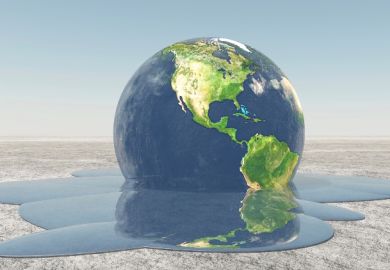Genocide studies is one of the major academic growth areas of recent years, a field notable for heated controversy. Making sense of the 20th century's infamous genocides and instances of ethnic cleansing, where the Jewish Holocaust overshadows everything else and may or may not be unique, has engaged an apparently ever-growing number of historians and sociologists.
The Dark Side of Democracy , by Michael Mann, professor of sociology at the University of California, Los Angeles, is a formidable and in some ways successful attempt to produce a sociological grand theory to explain these terrible events. Briefly put, Mann sees "murderous cleansing" as "modern, because it is the dark side of democracy". It occurs "when ethnicity trumps class as the main form of social stratification", especially in "contested territory" where the stronger power "believes it has overwhelming military power and ideological legitimacy". On the other hand, "murderous cleansing is rarely the initial intent of perpetrators" and "ordinary people are brought by normal social structures into committing murderous ethnic cleansing".
This complex and subtle argument is bolstered by detailed examinations of the Armenian genocide, the Nazi regime, communism, Yugoslavia, Rwanda and two "counterfactual cases" - India and Indonesia. Moreover, "genocidal democracies in the New World" - chiefly the US and the American Indians, and Australia and the Aborigines - are also briefly discussed.
In many respects, Mann's work represents contemporary historical sociology at its best - well informed, relevant, well evidenced and interesting - and all readers must have great respect for his conclusions, which are bound to have an impact on our conceptualisation of the topic. It is also particularly valuable that a talented analyst has attempted to bring together not merely the genocides of the 1914-45 period, but seemingly unrelated events that have occurred in the past decade or so, at a time when many people would have assumed such outbreaks of savagery were no longer possible.
There are features of Mann's approach and thesis that will raise eyebrows.
Most obviously, perhaps, is his use of the term "ethnic cleansing" to describe a range of activities that differ markedly, and also differ from genocide in the sense that this is commonly understood.
The term apparently originated as recently as 1992, when it was adopted by Serbian leaders and paramilitary forces in Bosnia. A variant of this term had been used by the Nazis, but it was not in common speech. Before the 1990s, however, there were many instances of forced population change on a large scale that did not attract condemnation by Left-liberals, and which, indeed, were generally seen as a humane, rather than an inhumane, solution to an intractable problem where ethnic conflict was likely to continue.
Probably the first agreed-on mass population transfers occurred in the early 1920s when Greece and Turkey exchanged hundreds of thousands of people who were in the "wrong" place. This was not at the time regarded as barbaric; the ethnically homogeneous states that have resulted have arguably been more peaceful and less bent on internal ethnic persecution than would otherwise have been the case.
Probably the most significant example of ethnic cleansing as forced population movement in the 20th century is mentioned in this work in only a brief discussion: the expulsion of about 16 million Germans, Poles and Ukrainians from their homelands in 1944-48. Although perhaps a third fled more or less voluntarily ahead of the victorious Soviet Army, probably two thirds were expelled by treaty or by fiat.
Virtually the entire population of Sudeten Germans, some 3 million people, were expelled in 1945-47, such that the "Sudetenland", the cause of the Munich crisis of 1938, no longer exists. Far from being seen as monstrous, the general attitude in the West was that the uprooted Germans got what they deserved and could expect no sympathy. Clement Attlee, Britain's Labour leader, stated in 1945 that they "are not entitled to appeal on the basis of moral laws they have disregarded or the pity and mercy that they have never extended to any other".
Arguably, these Germans were vastly better off in the prosperous, democratic Federal Republic of Germany than as a detested minority in a Stalinist satellite. As recently as 1972, as incredible as this may seem, the UK Government under Edward Heath discussed a secret plan to compulsorily transfer up to 500,000 Catholics in Northern Ireland to the Irish Republic in exchange for 200,000 Protestants from the south. It was decided not to proceed with this plan, although it was not ruled out. It could be argued that these examples are, to a certain extent, rooted in the victorious Wilsonian European settlement of 1918-19 and did not strike persons of goodwill at the time as monstrous. Good fences make good neighbours, said Robert Frost, and perhaps he was right.
It will also strike many readers as strange that Mann finds ethnic cleansing as rooted in the dark side of democracy, when most of the regimes that carried them out were totalitarian: not merely strange, but Orwellian.
Mann distinguishes between "two versions of 'We the People'", " demos " and " ethnos ", but the distinction, in many ways valuable, can be taken too far.
Hitler was a racial-nationalist fanatic of the supremacy of the German "Aryan" people, but he destroyed German democracy.
In fact, genuine democracies, although they obviously include a fair measure of ethnos in their ruling ideologies, are largely and increasingly immune to the most extreme features of ethnic hatred; their institutions work to diminish these rather than to enhance them. Mann sees the origins of murderous ethnic cleansings largely in war, and one factor among democracies that acts to diminish the genocidal component of conflict is that no democracies have ever fought against each other in any war. This is as good a reason as any to work to increase their number.
William D. Rubinstein is professor of history, University of Wales, Aberystwyth.
The Dark Side of Democracy: Explaining Ethnic Cleansing
Author - Michael Mann
Publisher - Cambridge University Press
Pages - 580
Price - £45.00 and £17.99
ISBN - 0 521 83130 X and 53854 8
Register to continue
Why register?
- Registration is free and only takes a moment
- Once registered, you can read 3 articles a month
- Sign up for our newsletter
Subscribe
Or subscribe for unlimited access to:
- Unlimited access to news, views, insights & reviews
- Digital editions
- Digital access to THE’s university and college rankings analysis
Already registered or a current subscriber? Login



